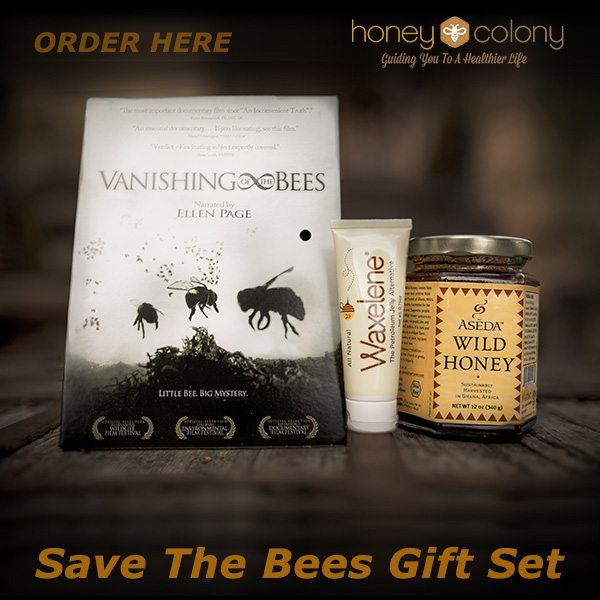Bees that Survive and Thrive: Their Care In Our Hands
Concern for honeybees is high, but are people really aware of what it might mean to conserve a farmed creature? This is the question I kept asking myself while researching and writing Farming for the Landless: New Perspectives on the Cultivation of our Honeybee.
In recent years, devastating honeybee losses have resulted in rallying calls to ‘save our bees’. Media interest and a multitude of campaigns have rightfully raised public awareness, but this has also resulted in a reinforcement of popular myths. Therefore, a book that analyzes the cultural significance of new science, lobbying, campaigning, and political decision-making regarding the honeybee seemed essential.
Have you seen Vanishing of the Bees yet? Discover the healing properties of these bee products today!
The Search For Answers
As a cultural study of the honeybee and our changing perceptions of its value, the book is full of first-hand accounts of the meetings I had with beekeepers, agricultural scientists, ecologists and beekeeping representatives. During an invaluable six-month’s leave from lecturing at the University of Westminster in London, I kick-started the project with a research trip across Europe, visiting bee-centric projects, museums, and organizations.
I’ve highlighted the views and experiences of contributors based on the specifics of their practices such as remote beekeeping on non-agricultural land (strongly evident in North Sweden), community beekeeping projects established in urban regeneration areas (i.e Paris and London), commercial beekeeping concerned with ecology (exampled in rural England), and small-scale beekeeping co-existing with large-scale agriculture (as in Austria).
In each case, I was particularly interested in land-use where the apiaries are kept. The beekeeping elders I interviewed in Kosovo, for example, keep around 80 hives in the middle of their village, outside Pristina, surrounded by post-war fallow land. In Romania, meanwhile, I met small-scale migratory beekeepers whose bees pollinate masses of sunflowers on arid, chemically-treated, industrial farmland near the reedy Danube Delta.
Positive Steps
Thankfully, through lots of hard work, positive steps are being made to relieve honeybees of the combined stress of agricultural chemicals, viruses, parasites, and low genetic diversity. In 2013, the EU suspended neonicotinoids, which have been scientifically proven to be highly dangerous and toxic to honeybees. COLOSS, an international association of scientists, beekeepers, and industry members from 69 countries, is now coordinating the global prevention of honeybee colony losses. Local queen-rearing and the adaptation of honeybee colonies to specific biomes is increasingly being recognized as beneficial to bee health, which helps discourage the international transportation of bees.
Meanwhile, pollinator habitats are being increased through pilot schemes such as Buglife’s B-lines in the UK. And finally, educational beekeeping projects are re-connecting communities with husbandry and harvest.
Farming For The Landless
Travelling across Europe meeting beekeepers and seeing a variety of independent rural projects also influenced my next directional steps. Although I once shared an allotment in London, I saw little chance of developing a close relationship with land through farming in the UK. As a creative person with more desire for time than money, I aimed to share rather than buy and own land.
Five years ago, I arrived in a small Alpine village in Val Aupa, Friuli Venezia Giulia, Italy, where I decided to stay. The few families that remain in the valley have seen many people migrate to flatter land, and they readily welcome newcomers. I found a sense of community here and, rather than choosing to leave London, I chose to move to Dordolla.
This rural corner of the world is currently amidst a critical revival. I’ve been involved in a fledgling land-sharing scheme, have helped deliver a food sovereignty conference, and am currently co-organizing Harvest 2015, a combined arts and agriculture festival that will be held this coming October. The festival will incorporate artist residencies, musical events, agricultural and creative workshops, film screenings and, of course, some harvest festival food events.
The mountainous area of this region, which is situated on the border with Austria and Slovenia, is also celebrated for nature. Its secluded valleys protect some of the rarest Alpine flora and are rich in wild pollinators. It’s also home to A. mellifera carnica, the carniolan honeybee, which freely crosses all three human borders and naturally hybridizes with its near neighbor, A. mellifera ligustica, the Italian bee.
My themes of agriculture and ecology co-exist well here and there’s plenty for me to keep studying and sharing.
Beekeeping: The Ultimate ‘Farming For The Landless’
Following the bees has taken me to clandestine places: I’ve seen hives concealed on roofs, perched on terraces, hidden on scrubland, secluded in disused yards, and nestled within forest glades.
In the countryside, beekeepers commonly position their hives on wasteland, behind hedgerows and along field margins, where they exist both physically and perceptually on the fringes of agriculture. The bees from these hives that forage the surrounding land for nectar and pollen notoriously perform a crucial role in plentiful crop production, however. While modern agriculture is synonymous with landownership and big-business, beekeeping is ‘farming for the landless’.
Because bees feed on wild flowers, tree blossom, and honeydew, they remind us of farming’s symbiotic relationship with the wider environment. Bees that aren’t thriving or even surviving are therefore indicative of an ecological imbalance. Colonies that produce copious honey from wild flowers near the Arctic Circle, or the fallow fields of Kosovo, or those that feed on more varied forage in Paris than in the countryside are healthier because they are far away from modern agriculture. Importantly, we are now conscientiously planting bee-friendly flowers in our gardens, but what of our need for bee-friendly crops?
Encouragingly, in this moment of heightened awareness, our engagement with bees and beekeeping, and as a result agriculture, isn’t distant and abstract but present, real, and vital.
In his review of the book, John Phipps, editor of the Beekeepers Quarterly, says:
“This is an important and timely book relevant for beekeepers, farmers, conservationists and anyone who has an interest in our environment. It should be of considerable interest, too, to lay people, who have become aware of some of the problems bees are facing, as dished about by the media, so that they have a better understanding of the issues involved. Sarah has tackled a very difficult and emotive subject rationally, giving the reader an enormous amount of information to digest and consider. It is a very readable book, broken up beautifully from time to time with lyrical passages describing her time with bees and the varied landscapes through which she traveled.”
 Sarah Waring lives and works in the UK and Italy. She studied Fine Art Photography at the Royal College of Art, lectured at the University of Westminster and University of the Arts, and worked as a writer and media publishing editor in London. She has traveled extensively throughout rural Europe where her interests in ecology and agriculture have been brought to life especially via hands-on experience in Austria, Italy, Sweden and Wales.
Sarah Waring lives and works in the UK and Italy. She studied Fine Art Photography at the Royal College of Art, lectured at the University of Westminster and University of the Arts, and worked as a writer and media publishing editor in London. She has traveled extensively throughout rural Europe where her interests in ecology and agriculture have been brought to life especially via hands-on experience in Austria, Italy, Sweden and Wales.
Submit your story or essay to Buzzworthy Blogs.




